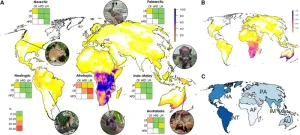(Press-News.org) DURHAM, N.C. –- Most kids know it’s wrong to yell or hit someone, even if they don’t always keep their hands to themselves. But what about if that someone’s name is Alexa?
A new study from Duke developmental psychologists asked kids just that, as well as how smart and sensitive they thought the smart speaker Alexa was compared to its floor-dwelling cousin Roomba, an autonomous vacuum.
Four- to eleven-year-olds judged Alexa to have more human-like thoughts and emotions than Roomba. But despite the perceived difference in intelligence, kids felt neither the Roomba nor the Alexa deserve to be yelled at or harmed. That feeling dwindled as kids advanced towards adolescence, however. The findings appear online April 10 in the journal Developmental Psychology.
The research was inspired in part by lead author Teresa Flanagan seeing how Hollywood depicts human-robot interactions in shows like HBO’s “Westworld.”
“In Westworld and the movie Ex Machina, we see how adults might interact with robots in these very cruel and horrible ways,” said Flanagan, a visiting scholar in the department of psychology & neuroscience at Duke. “But how would kids interact with them?”
To find out, Flanagan recruited 127 children aged four to eleven who were visiting a science museum with their families. The kids watched a 20-second clip of each technology, and then were asked a few questions about each device.
Working under the guidance of Tamar Kushnir, Ph.D., her graduate advisor and a Duke Institute for Brain Sciences faculty member, Flanagan analyzed the survey data and found some mostly reassuring results.
Overall, kids decided that both the Alexa and Roomba probably aren’t ticklish and wouldn’t feel pain if they got pinched, suggesting they can’t feel physical sensations like people do. However, they gave Alexa, but not the Roomba, high marks for mental and emotional capabilities, like being able to think or getting upset after someone is mean to it.
“Even without a body, young children think the Alexa has emotions and a mind,” Flanagan said. “And it’s not that they think every technology has emotions and minds -- they don’t think the Roomba does -- so it’s something special about the Alexa’s ability to communicate verbally.”
Regardless of the different perceived abilities of the two technologies, children across all ages agreed it was wrong to hit or yell at the machines.
“Kids don’t seem to think a Roomba has much mental abilities like thinking or feeling,” Flanagan said. “But kids still think we should treat it well. We shouldn't hit or yell at it even if it can't hear us yelling.”
The older kids got however, the more they reported it would be slightly more acceptable to attack technology.
“Four- and five-year-olds seem to think you don't have the freedom to make a moral violation, like attacking someone," Flanagan said. “But as they get older, they seem to think it's not great, but you do have the freedom to do it.”
The study’s findings offer insights into the evolving relationship between children and technology and raise important questions about the ethical treatment of AI and machines in general, and as parents. Should adults, for example, model good behavior for their kids by thanking Siri or its more sophisticated counterpart ChatGPT for their help?
For now, Flanagan and Kushnir are trying to understand why children think it is wrong to assault home technology.
In their study, one 10-year-old said it was not okay to yell at the technology because, “the microphone sensors might break if you yell too loudly,” whereas another 10-year-old said it was not okay because “the robot will actually feel really sad.”
“It’s interesting with these technologies because there's another aspect: it’s a piece of property,” Flanagan said. “Do kids think you shouldn't hit these things because it's morally wrong, or because it's somebody's property and it might break?”
This research was supported by the U.S. National Science Foundation (SL-1955280, BCS-1823658).
CITATION: “The Minds of Machines: Children’s Beliefs About the Experiences, Thoughts, and Morals of Familiar Interactive Technologies,” Teresa M. Flanagan, Gavin Wong, Tamar Kushnir. Developmental Psychology, April 10, 2023. DOI: 10.1037/dev0001524.
END
Kids judge Alexa smarter than Roomba, but say both deserve kindness
Four to 11-year-olds deem it wrong to attack either semi-intelligent robot
2023-04-10
ELSE PRESS RELEASES FROM THIS DATE:
Hooper creating public database of slaving voyages across the Indian Ocean and Asia
2023-04-10
Jane Hooper, Associate Professor, History, received funding for the project: "Global Passages: Creating a Public Database of Slaving Voyages across the Indian Ocean and Asia."
Hooper, along with three other scholars, has received a three-year digital production grant from the National Endowment for the Humanities to support a major expansion of the open access SlaveVoyages website, available online at https://www.slavevoyages.org. The primary investigators will create an Indian Ocean and Asia (IOA) database of voyages that ...
A new technique opens the door to safer gene editing by reducing the mutation problem in gene therapy
2023-04-10
CRISPR-Cas9 is widely used to edit the genome by studying genes of interest and modifying disease-associated genes. However, this process is associated with side effects including unwanted mutations and toxicity. Therefore, a new technology that reduces these side effects is needed to improve its usefulness in industry and medicine. Now, researchers at Kyushu University in southern Japan and Nagoya University School of Medicine in central Japan have developed an optimized genome-editing method that vastly reduces mutations, opening the door to more effective treatment of genetic diseases with fewer unwanted mutations. Their findings were published in Nature Biomedical Engineering.
Genome-editing ...
Medicaid ‘cliff’ adds to racial and ethnic disparities in care for near-poor seniors
2023-04-10
PITTSBURGH, April 10, 2023 – Black and Hispanic older adults whose annual income is slightly above the federal poverty level are more likely than their white peers to face cost-related barriers to accessing health care and filling medications for chronic conditions, according to new research led by a University of Pittsburgh School of Public Health scientist.
Published today in JAMA Internal Medicine, the analysis links these disparities to a Medicaid “cliff” – an abrupt end ...
Potential drug treats fatty liver disease in animal models, brings hope for first human treatment
2023-04-10
A recently developed amino acid compound successfully treats nonalcoholic fatty liver disease in non-human primates — bringing scientists one step closer to the first human treatment for the condition that is rapidly increasing around the world, a study suggests.
Researchers at Michigan Medicine developed DT-109, a glycine-based tripeptide, to treat the severe form of fatty liver disease called nonalcoholic steatohepatitis. More commonly known as NASH, the disease causes scarring and inflammation in the liver and is estimated to affect up to 6.5% of the global population.
Results ...
Scientists show how we can anticipate rather than react to extinction in mammals
2023-04-10
Most conservation efforts are reactive. Typically, a species must reach threatened status before action is taken to prevent extinction, such as establishing protected areas. A new study published in the journal Current Biology on April 10 shows that we can use existing conservation data to predict which currently unthreatened species could become threatened and take proactive action to prevent their decline before it is too late.
“Conservation funding is really limited,” says lead author Marcel Cardillo (@MarcelCardillo) of Australian National University. “Ideally, what we need is some way of anticipating species that may not be threatened ...
This elephant’s self-taught banana peeling offers glimpse of elephants’ broader abilities
2023-04-10
Elephants like to eat bananas, but they don’t usually peel them first in the way humans do. A new report in the journal Current Biology on April 10, however, shows that one very special Asian elephant named Pang Pha picked up banana peeling all on her own while living at the Berlin Zoo. She reserves it for yellow-brown bananas, first breaking the banana before shaking out and collecting the pulp, leaving the thick peel behind.
The female elephant most likely learned the unusual peeling behavior ...
Health care access, affordability among adults with self-reported post–COVID-19 condition
2023-04-10
About The Study: In this survey study of 9,400 adults ages 18 to 64, a higher rate of respondents with self-reported post–COVID-19 condition (PCC; also known as long COVID) did not obtain needed health care in the past year because of cost compared with adults without PCC. Adults with PCC were also more likely to have unmet needs because of difficulties getting timely appointments or health plan authorization, among other challenges with health care institutions or health insurance. These findings suggest that improved health care access for adults with PCC may require developing clinical protocols and addressing insurance-related barriers.
Authors: Michael ...
Changes in children’s screen time during pandemic
2023-04-10
About The Study: The largest increase in children’s recreational screen time during the pandemic was on weekdays, especially at the outset of the pandemic when schools were closed; this increase was greater than expected for age-related growth. Change in weekend screen time during the pandemic was not significant compared with weekday screen time. Once in-person school resumed, weekday screen time decreased versus that during the COVID-1 wave (spring 2020), although it remained consistently higher than pre-pandemic estimates and age-related expectations.
Authors: Sheri Madigan, Ph.D., of the University of Calgary in Calgary, Canada, is the corresponding ...
Study: Shutting down nuclear power could increase air pollution
2023-04-10
Nearly 20 percent of today’s electricity in the United States comes from nuclear power. The U.S. has the largest nuclear fleet in the world, with 92 reactors scattered around the country. Many of these power plants have run for more than half a century and are approaching the end of their expected lifetimes.
Policymakers are debating whether to retire the aging reactors or reinforce their structures to continue producing nuclear energy, which many consider a low-carbon alternative to climate-warming coal, oil, and natural gas.
Now, MIT researchers say there’s another factor to consider in weighing the future of nuclear power: ...
Study shows involuntary displacement of people experiencing homelessness may cause significant spikes in mortality, overdoses and hospitalizations
2023-04-10
AURORA, Colo. (April 10, 2023) – Involuntary displacement of people experiencing homelessness will likely lead to a substantial increase in morbidity and mortality over a 10-year period.
In a study, published today in the Journal of the American Medical Association (JAMA), researchers say practices such as encampment sweeps, bans, move-along-orders and cleanups that forcibly relocate individuals away from essential services will lead to substantial increases in overdose deaths, life threatening infections and hospitalizations.
In coordination with the National Healthcare for Homeless Council, the Center for Disease Control and Prevention (CDC) and the National Foundation ...
LAST 30 PRESS RELEASES:
Maps can encourage home radon testing in the right settings
Exploring the link between hearing loss and cognitive decline
Machine learning tool can predict serious transplant complications months earlier
Prevalence of over-the-counter and prescription medication use in the US
US child mental health care need, unmet needs, and difficulty accessing services
Incidental rotator cuff abnormalities on magnetic resonance imaging
Sensing local fibers in pancreatic tumors, cancer cells ‘choose’ to either grow or tolerate treatment
Barriers to mental health care leave many children behind, new data cautions
Cancer and inflammation: immunologic interplay, translational advances, and clinical strategies
Bioactive polyphenolic compounds and in vitro anti-degenerative property-based pharmacological propensities of some promising germplasms of Amaranthus hypochondriacus L.
AI-powered companionship: PolyU interfaculty scholar harnesses music and empathetic speech in robots to combat loneliness
Antarctica sits above Earth’s strongest “gravity hole.” Now we know how it got that way
Haircare products made with botanicals protects strands, adds shine
Enhanced pulmonary nodule detection and classification using artificial intelligence on LIDC-IDRI data
Using NBA, study finds that pay differences among top performers can erode cooperation
Korea University, Stanford University, and IESGA launch Water Sustainability Index to combat ESG greenwashing
Molecular glue discovery: large scale instead of lucky strike
Insulin resistance predictor highlights cancer connection
Explaining next-generation solar cells
Slippery ions create a smoother path to blue energy
Magnetic resonance imaging opens the door to better treatments for underdiagnosed atypical Parkinsonisms
National poll finds gaps in community preparedness for teen cardiac emergencies
One strategy to block both drug-resistant bacteria and influenza: new broad-spectrum infection prevention approach validated
Survey: 3 in 4 skip physical therapy homework, stunting progress
College students who spend hours on social media are more likely to be lonely – national US study
Evidence behind intermittent fasting for weight loss fails to match hype
How AI tools like DeepSeek are transforming emotional and mental health care of Chinese youth
Study finds link between sugary drinks and anxiety in young people
Scientists show how to predict world’s deadly scorpion hotspots
ASU researchers to lead AAAS panel on water insecurity in the United States
[Press-News.org] Kids judge Alexa smarter than Roomba, but say both deserve kindnessFour to 11-year-olds deem it wrong to attack either semi-intelligent robot






